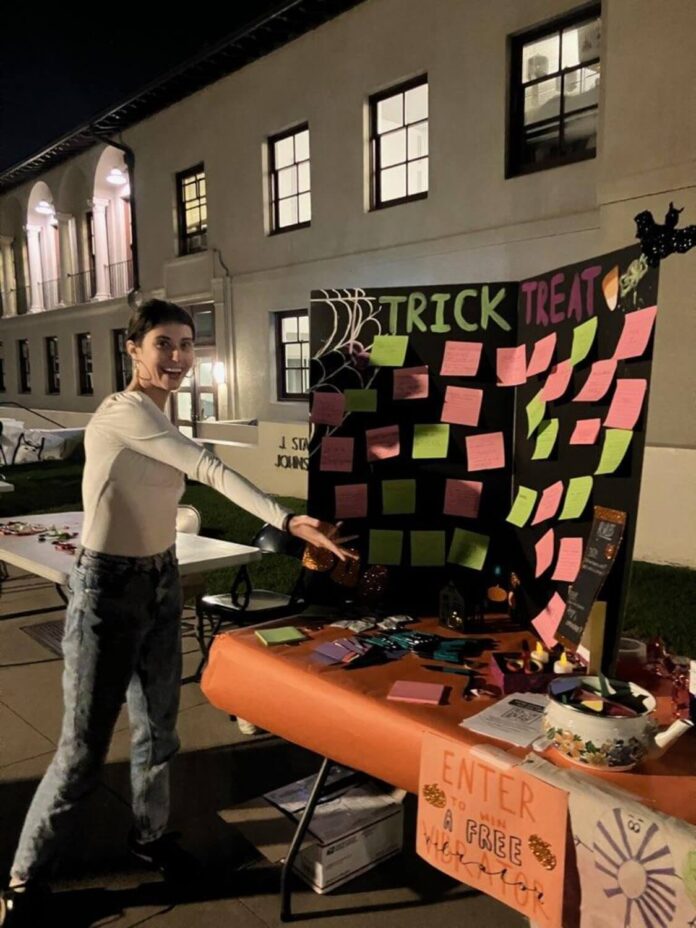
Content warning: This article contains discussions of sexual assault on campus.
Nov. 12, 2021, the Oxy Sexual Assault Coalition (OSAC) led a demonstration in response to an increase in the number of Title IX complaints following the 2020-2021 virtual school year. Nearly, two years later, OSAC has announced their partnership with the Callisto Project, a national nonprofit that uses technology to provide a safe alternative to reporting sexual assault. According to OSAC members Cameron Auyang (senior) and G Northway (senior), OSAC hopes to continue addressing the concerns that drove the 2021 demonstration by bringing the nonprofit’s product Callisto Vault to Occidental.
Title IX coordinator Alexandra Fulcher said via email that the college’s Title IX office was not consulted during the implementation of Callisto Vault on campus.
Callisto Vault is a free and encrypted service, meaning that any information entered through accounts is not publicly accessible, according to Callisto Chief Executive Officer Tracy DeTomasi. Callisto Vault offers survivors two separate features, DeTomasi said.
The first feature offered through Callisto Vault is called the Matching System. Once students create an account using their Occidental email address, they can enter specific and unique identifiers of their assailant, such as phone number, email address or social media handle.
“We did it really quick and easy, where they don’t actually have to share their experience, because sharing an experience is really traumatizing for certain survivors,” DeTomasi said.
If any other student using the website — at or outside of Occidental — enters an identical identifier implicating the same perpetrator, both survivors are notified of the match and allotted the opportunity to consult with a legal options counselor, DeTomasi said.
According to DeTomasi, the purpose of this specific feature is to indicate instances of repeat offenders, and hopefully draw attention to perpetrators before they can continue to offend.
“If multiple people are saying, ‘No, this happened, this is a pattern of this person’s behavior,’ it can lead to a stronger case, and perhaps more importantly, it can lead to confidence, because a lot of times there can be guilt associated with pursuing any form of action at all,” said Auyang.
DeTomasi said this intended effect could have a large impact on lowering overall rates of sexual assault on college campuses, as the majority of undetected college rapists are likely serial perpetrators, committing an average of six rapes each.
The program also aims to raise the 20 percent of college sexual assaults reported by allowing survivors to build stronger cases and feel more supported in their ability to report, according to Auyang and Northway. The potential positive impact on survivors alone is a substantial appeal to the website, Northway said.
“It can be really [validating], even if you don’t pursue legal action, knowing that you are genuinely not alone, especially in cases where it isn’t as clean cut,” Northway said.
The second feature of Callisto Vault is the Incident Log, which allows survivors to securely document a timestamped record of their assault when or if they want to file an official report. This feature intends to validate a survivor’s account, without pressuring them to make an immediate decision about how to move forward following an assault.
According to Northway and DeTomasi, this feature arose in response to the criticism of survivors who may wait to report, for reasons ranging from their relationship with the perpetrator to overwhelming feelings of shame or fear.
“However long you wait, it still happened,” Northway said.

Although Callisto Vault may lead to an increase in reporting, it is not used to specifically file reports, according to DeTomasi.
“What’s unique about us is that we’re not actually a reporting tool, we’re something to really help survivors,” DeTomasi said.
Northway and Auyang said that both features of Callisto Vault have the potential to make big changes in terms of stopping repeat offenders before they can do more damage and aid survivors in the wake of their assaults. Specifically within Occidental’s small population, Northway and Auyang said they believe the use of the service could have a considerable impact, and not only by increasing the amount of available resources for survivors.
“Being in the same community, as either a friend or a friend of a friend of the person who hurt you can just become unavoidable, and sometimes that can make it difficult to speak out,” said Auyang.
Auyang also said that because of this, encrypted logs may help survivors be more comfortable within the Occidental community, without having to publicly announce their assault. Ninety percent of campus sexual assaults are committed by perpetrators that the survivor knows.
DeTomasi said that Callisto Vault is helpful no matter at which university it is used.
“Sexual assault is pervasive everywhere. It’s not one school,” DeTomasi said.
Auyang and Northway said OSAC encourages Occidental students to use the website, no matter how small the incident may be perceived as. Northway said that instances that might be considered less stereotypically severe, like drugging or intimate partner violence, can still have intense negative effects on a victim.
“Trauma in your body doesn’t care about how extreme anyone thinks violence is,” Northway said.

Auyang said he first became aware of Callisto Oct. 2022 when a member of UCLA’s Double Jeopardy — a club dedicated to addressing sexual violence in Asian and Pacific Islander communities — sent him an article published about USC’s intersectional feminist club’s relationship to the program.
“They were promoting something called Callisto. And we weren’t really sure what this was. But we did a little bit of digging into it,” Auyang said. “It sounded fantastic.”
Following dedicated research into the program and approval of its usage by Project SAFE, Auyang and Northway said they finally began communication with Callisto leadership in April 2023. According to DeTomasi, the early point of contact led Callisto to invite Occidental students, along with a handful of other colleges, to access the Callisto Vault website in the summer before the website’s official launch Oct. 16.
According to Auyang and Northway, they helped facilitate the connection between Occidental and Callisto, and now fulfill the role of Callisto Ambassadors. Auyang and Northway said that within this role, they advocate for the company’s services and mission, communicate with Callisto leadership about awareness efforts at Occidental and connect with ambassadors at other schools.
“We [had] people at Occidental reach out and say we need this service now. It’s imperative now,” DeTomasi said. “We knew we had students who are passionate about spreading the word because the technology is only as good as the amount of people that know about it.”
Whilst the anger seen during the 2021 demonstration represented the passion of students aimed towards the need for change, Callisto Vault now represents OSAC’s current priorities, Northway said.
“Something that I’ve learned is the importance of focusing on love of the survivor rather than hatred of the abuser,” said Northway.
Contact Paige Thomas at pthomas2@oxy.edu
![]()






























